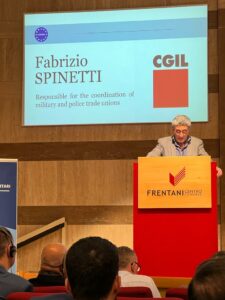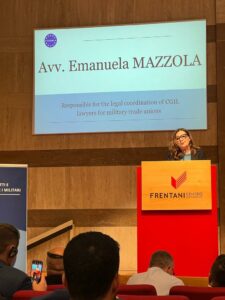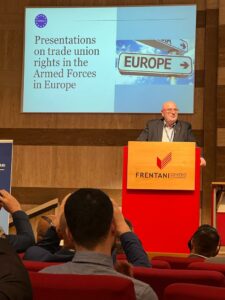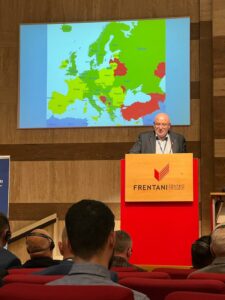EUROMIL’s “Italian Session”: The Struggle for Trade Union Rights for Military Personnel
On April 27th 2023, EUROMIL hosted an “Italian session” at the Centre Congressi Frentani in Rome. The event brought together members of EUROMIL’s 127th General Assembly and about 45 representatives from Italian military associations. The session highlighted the challenges faced by military personnel in Italy when it comes to trade union rights, emphasizing the need for further action to improve the situation.
Mr Emmanuel Jacob, EUROMIL’s President, opened the event by stating the importance of trade union rights for military personnel and by highlighting ASSODIPRO’s long-lasting fight to defend military personnel’s rights and to change the Italian legislation, in close collaboration with CGIL.
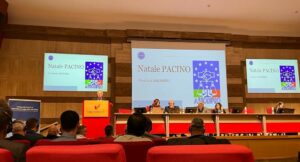 ASSODIPRO’s President, Mr Natale Pacino, spoke about the challenges faced by military personnel when it comes to trade union rights in Italy. He highlighted that, despite the 2018 Constitutional Court decision (Sentenza n. 120 del 13 giugno 2018) on this matter, military personnel are still struggling to exercise their rights properly due to the limitations set by the Italian law on representation, namely Law 46/2022. According to Mr Pacino, it is imperative to pursue judicial avenues to ensure that military personnel’s trade union rights can be fully exercised.
ASSODIPRO’s President, Mr Natale Pacino, spoke about the challenges faced by military personnel when it comes to trade union rights in Italy. He highlighted that, despite the 2018 Constitutional Court decision (Sentenza n. 120 del 13 giugno 2018) on this matter, military personnel are still struggling to exercise their rights properly due to the limitations set by the Italian law on representation, namely Law 46/2022. According to Mr Pacino, it is imperative to pursue judicial avenues to ensure that military personnel’s trade union rights can be fully exercised.
Mr Fabrizio Spinetti, responsible for the coordination of military and police trade unions at CGIL, highlighted the challenges that the military faced in the democratization process that began in the early 1990s. While legislative changes were implemented for the police, the military faced more significant challenges. Mr Spinetti stated how the Constitutional Court’s ruling in 2018 and Law 46/2022 were meant to address this issue. However, this was not the case, as the ECSR has highlighted in its 2022 Conclusions on the Italian national report, in which the law’s non-compliance with the Charter and its imposition of restrictions on rights is stated. Mr Spinetti also noted how discontent in the military environment is leading to suicides, a complex phenomenon with significant influence in Italy, with 72 suicides reported in 2022.
The event continued with speeches from Professor Vittorio Angiolini, Constitutional Lawyer, and Lawyer Emanuela Mazzola, responsible for the legal coordination of CGIL lawyers for military trade unions.
Professor Angiolini addressed the issue of fundamental rights in the military and the ambiguities and aspects that need to be clarified in the 2018 judgement. He highlighted the limitation for military associations to join other unions, which goes against the democratic principle of the military system under Article 52 of the Italian Constitution. Lawyer Mazzola, on the other hand, drew attention to the law’s anti-trade union nature, which discourages trade union membership by depriving individuals of their freedom. Furthermore, she stressed the importance of individual protection, as current protection measures are solely collective, while problems are often individual. Additionally, she noted the significant control that the law exercises over associations, and emphasized the law’s limitation in stripping away territorial-level representative power, which is crucial for identifying workplace issues effectively.
The second part of the session focused on exchanging best practices with other European countries, highlighting the need for dialogue and work towards solutions that promote the rights of military personnel while also respecting the unique nature of military service.
The “Italian session” concluded with the approval of a resolution by EUROMIL’s General Assembly, highlighting the outcome of the debate and the way ahead.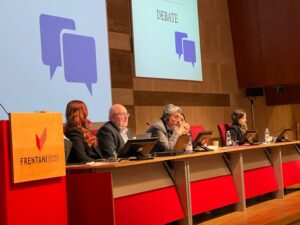
In conclusion, the “Italian session” emphasized the need for further action to improve the trade union rights of military personnel in Italy. The current law has not created the conditions for the proper exercise of these rights, and there is a risk of further limitations. The struggle for trade union rights in the military is a global issue that requires attention from policymakers, military leaders, and civilian society alike. Achieving a balance between the military’s unique needs and its members’ fundamental rights is a complex challenge, but it is essential for ensuring the well-being and effectiveness of military personnel.
The approved resolution can be read here.


